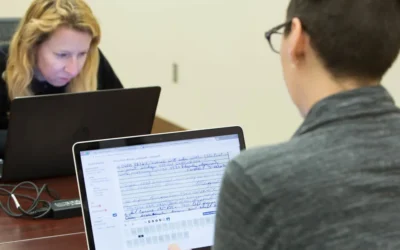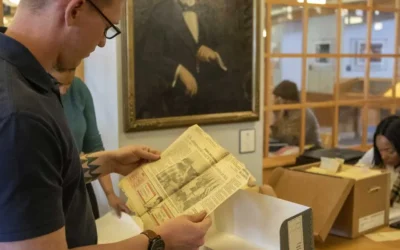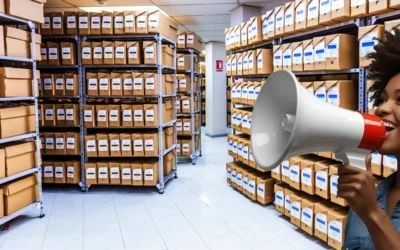Communication and Collaboration Through CMS Email Integration
Margot Note
Collections management systems (CMS) help archivists monitor and maintain collections, making it much easier to search for information about specific collections quickly and update that information when needed.
Email is the de facto communication method for organizations, including archives and special collections. People send billions of emails every day, a non-stop conversation between organizations and their users worldwide. However, sending emails manually is time-consuming and error-prone. Doing so at the scale needed to fulfill research requests is difficult to do without an integrated solution and requires a developer’s attention and constant maintenance. Email integration within an archival collections management system allows for a better user experience while freeing archivists from the traditional confines of legacy systems or no systems at all. Request management for archives, used in conjunction with email generation, allows archivists to focus on the in-depth knowledge work they are trained to do: communicating with users and collaborating with each other.
Improved Communication
An archival CMS can also generate a wide variety of useful reports, notices, and letters. Archivists can email information without leaving the interface, using custom-designed forms and templates. They can select the needed fields, customize language, and present branded communication to users. The CMS integrates with email for automated request submission and response, with file attachments, relevant links, and comments. The email capability makes it much easier to manage the day-to-day operations of a repository. As email is a direct way to send data, generating and distributing information saves both time and money—and everyone benefits from the speed and convenience. Archivists can be confident that the right people will see the information they provide at the right time. In addition, users can also benefit from the high-touch experience of working with an archival repository and building a relationship with archivists throughout the research process.
On-the-Go Delivery
Mobile support allows users to access information whenever they need it, wherever they are, through whatever devices they prefer. For archivists, there is universal access to organizational resources anytime, anywhere, on any device. This flexibility allows users and archivists to experience research in a method that mirrors their everyday information-seeking tasks. Rather than treating archival research as something complicated or intimidating, as it is sometimes thought to be, mobile access makes records of enduring value as accessible as any Google search.
Collaboration with Colleagues
A robust CMS with request management capabilities provides business intelligence that supports operational decisions. In terms of tracking requests, archivists can see who on staff has been contributing the most, so the work is not falling disproportionately to one colleague or just a few team members. Processes can be improved to distribute the work more evenly. In addition, archivists can rely on each other’s expertise on specific collections and collaborate more easily when colleagues hit roadblocks.
Freedom from the IT Department
A CMS system should also provide design, administration, and configuration tools that archivists can set up themselves, so they depend less on IT departments. Making changes to a system without much technical knowledge can save money for repositories that outsource IT work to vendors or charge internally by department needs.
For example, dynamic reporting allows for daily automatic updates that can be accessed or emailed to staff members. The ability to have real-time data, without special coding, frees the dependence on the IT department to create customized reports.
Effective Communication
A sophisticated archival CMS, which manages and tracks requests via email integration, enables much more than statistics and reporting. Archivists can mine the usage data created by the system to expose knowledge and training gaps, develop marketing strategies, reallocate resources, and deliver evidence of value. Armed with the data, archivists can transform how they communicate information, better align their efforts with organizational imperatives, and measure the archives’ impact.
Margot Note
Margot Note, archivist, consultant, and author is a guest blogger for Lucidea, provider of ArchivEra, archival collections management software for today’s challenges and tomorrow’s opportunities. Read more of Margot’s posts, and register here for her upcoming webinar, “CMS Essentials for Success #4: Email Integration” on April 21, 2021.
Similar Posts
Collaborative Archival Relationships
Collaborative projects are instrumental in showcasing how archival collections can benefit various organizational departments.
Informational, Evidential, and Intrinsic Values within Archives
Archives provide authentic, reliable information and hold values that reflect their functions and uses; informational, evidential, and intrinsic.
A Sustainable Archives
Archivists prioritize sustainable practices and policies, rooting their work in ethics of care, often preferring digital processing and preservation
Archival Branding and PR Strategies
Archivists who adopt branding and PR strategies both safeguard historical treasures and contribute to their organizations’ evolution.




Leave a Comment
Comments are reviewed and must adhere to our comments policy.
0 Comments